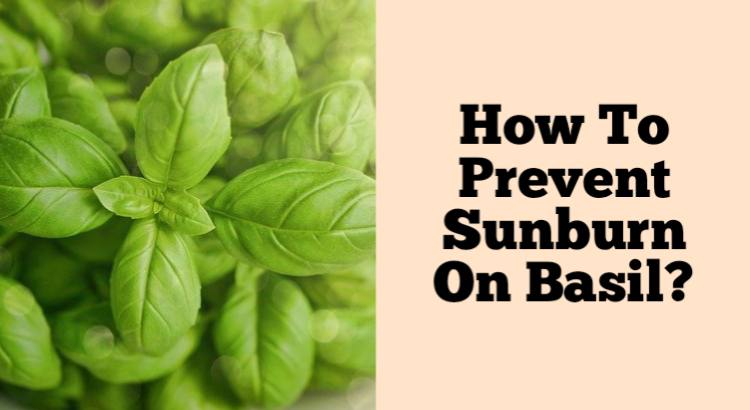You’ve probably heard of sunburn on the skin, but did you know that it can happen to plants, too? Basil plants are especially susceptible to sunburn, as this type of burn occurs when the temperature suddenly rises or falls without warning.
This can happen on any warm-weather plant in your garden, but basil is especially vulnerable due to its high concentration of essential oils that make it more sensitive than other herbs like rosemary and mint.
So if you’re wondering how to prevent basil sunburn or treat it once here are some signs and how to prevent it to happen.
What is basil sunburn?
Basil sunburn is a condition where the leaves of basil plants turn brown. It happens when they get too much direct sunlight, which can happen if they’re planted in full sun or even under shade cloth.
Basil needs at least six hours of sunlight each day for best growth and production; more than that can lead to burning on their leaves (basil sunburn), which will cause them to brown up and may drop off from the plant.
Sunburn on basil leaves can be caused by a sudden change in temperature.
If you have a basil plant, one of the most important things to remember is that it needs to be protected from direct sunlight.
Basil leaves can burn if they are exposed to the sun for too long, especially when there is a sudden change in temperature.
If you grow your basil outdoors, make sure you plant it in an area where it will get plenty of shade throughout the day.
Organic basil sunburn treatments are best.
If you’re going to use organic basil sunburn treatments and remedies, you should know a few things. First and foremost, avoid using chemical fertilizers or pesticides on your herb garden.
These chemicals can leach into the soil, damaging your plants and making them more susceptible to pest problems in the future.
Second, if you are experiencing a pest problem with your basil plants during the growing season (which usually occurs during summer), use organic pest control methods instead of using synthetic chemical pesticides on your herbs.
Finally, when applying mulch around your basil plants after they have been planted in their final locations, make sure that it is an organic mulch product such as compost or aged manure; these types of materials won’t damage roots like some manmade materials would do.
How to fix basal sunburn on basil plants
- Check the soil temperature. Basil plants love warm, sunny weather and can grow well even when temperatures reach the mid-90s Fahrenheit. But if you keep your plant in a bright room that gets too much sun all day, it may get sunburned.
- Avoid frost damage by keeping your basil plant outside only during warm months or bringing it indoors before cold weather hits; if you do not have an outdoor space to provide this protection, consider growing your basil indoors in a sunny window year-round or keeping it in a greenhouse instead.
- Keep the soil moist but not wet at all times; if your basil becomes too dry it will wilt but be careful not to overwater as well. A good way to ensure proper watering is by using a moisture meter.
Basil plants love heat, but they need protection from summer sun.
Don’t be surprised if your basil plants appear to collapse in the heat. Basil plants love heat, but they need protection from summer sun. Basil plants don’t like the cold or hot sun at all—they do best when temperatures are moderate and humidity levels stay high.
If you can keep that in mind as you plan your garden this year and protect them accordingly, you will have a lovely harvest of fresh herbs all summer long.
Avoid the three worst mistakes when growing basil – overwatering, overfertilizing, and letting the leaves get too wet while watering.
- Basil is a very hardy plant, so it’s not necessary to water it frequently.
- Even though you may think that watering your basil plant would be beneficial, this can actually cause problems for the plant and make it more susceptible to disease.
- Basil plants are susceptible to cold weather, so keep them indoors in winter.
Conclusion
Basil is a very easy herb to grow. The trick is to get the right balance of water and sun exposure. Too much water can cause problems, but so can too little or too much sun.
Preventing basil from getting sunburn will make them healthy in the long run. You’ll want also to avoid letting your basil plants get too wet when watering them, as this can lead to fungus or fungal disease.

